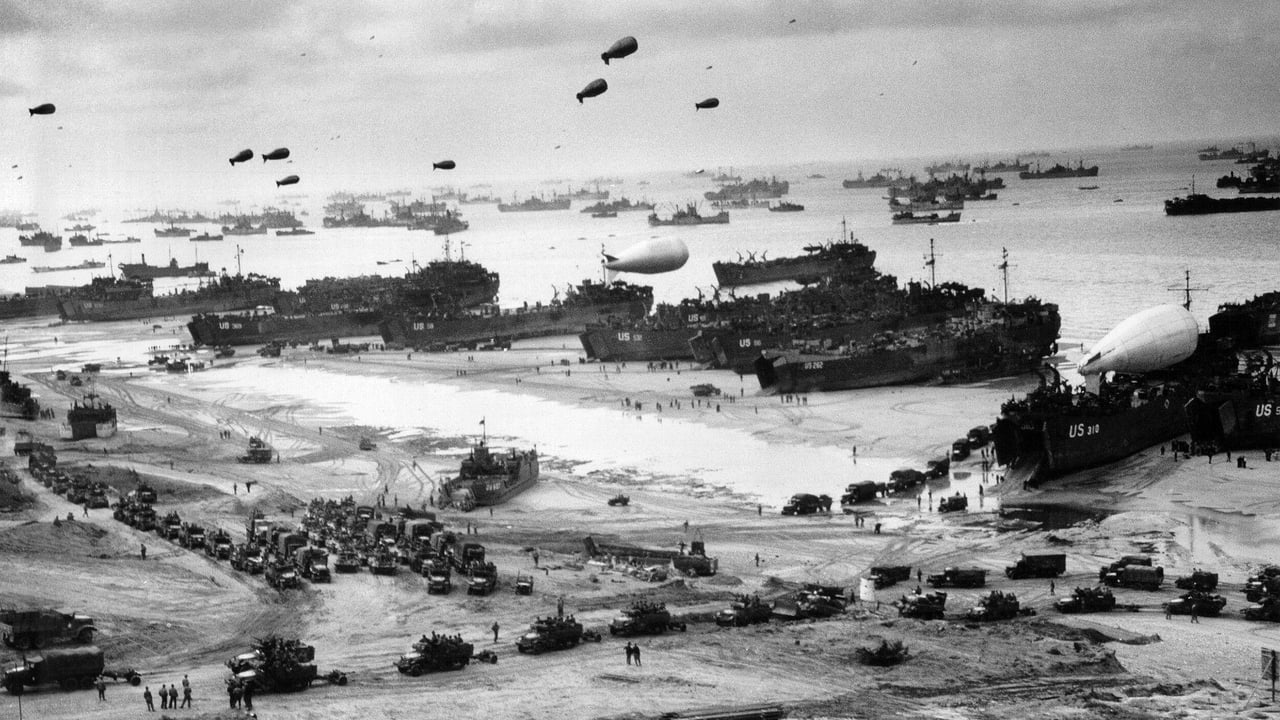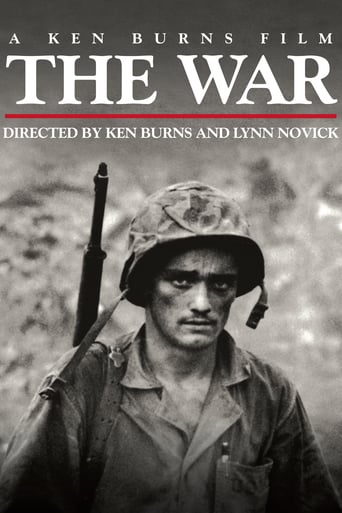

THE WAR is another exemplary documentary miniseries from filmmaker Ken Burns. Despite the lengthy running time (seven two hour episodes), this is never less than completely moving, engaging, and thoroughly insightful. I've already seen plenty of WW2 documentaries but it turns out that Burns still had plenty of say about the topic and plenty to teach. I like the way that the focus of the film is on four American towns, following the fortunes of various soldiers and pilots who enlisted for a hellish journey. The interviews are spellbinding, the unseen footage quite incredible, and Keith David's narration (along with that of uncredited Hollywood stars) the icing on the cake.
... View MoreI've watched this mini-series at least a half dozen times at this point. Each time, I learn new things. Each time, I'm completely enthralled. There is so much insight, so many things that I did not know about World War II that it is sometimes difficult to absorb everything that's related. And this is, mind you, just from the point of view of the United States and its soldiers, sailors, airmen and Marines.In particular, the first person stories told by those who were there, who fought or were prisoners during the war, are very engrossing. Their stories are poignant, and you genuinely feel their losses and their grief. Even after so many viewings, I frequently find myself tearing up at certain points. This is one of the many things that speaks to the enduring quality of the documentary. Keith David's narration is spot on, providing an anchor that is sometimes necessary considering the material being discussed.In short: I cannot recommend this more. Watch it.
... View MoreLet's start with the basics - this isn't 'the war', this is America's war. The Soviet Union, Nazi Germany, Imperial Japan and the British Empire - let alone Poland or China - only get a look in, with most of the pre-1941 war barely mentioned at all. The series limits itself even further. This is the war as seen by a few small towns in the US (except when it isn't). This is the war as experience, with a bare- bones narrative to connect and (partially) contextualise the personal stories. This is history as emotion - telling each other sad stories without ever understanding the deeper currents of human existence.What's more, Ken Burns is really most interested in the home front and in particular the racial aspect of America in the 1940s - which means that you have to steel yourself for endless guff about American racism against blacks and the Japanese (with the Hispanics tacked on after Latino pressure groups made a stink). Sorry, but Manzanar and Jim Crow is hard to get worked up with in a war that saw the Burma-Thailand Railway and Belsen. In truth 90% of America was white at the time, blacks and Japanese saw almost no combat and played a very minor support role in the war. That isn't to take away from the bravery of the 442nd or to deny that the Red Ball Express was important, just that in context of the American war effort (let alone in context of the global war that was raging) they are pretty unimportant.The music and the interviewees and much of the footage is very good. But the history is appalling; bereft of insight, overview and comprehension. The structure is awkward, the writing clumsy, the narrative plodding, and the whole thing manages to feel tremendously pompous in that special PBS way. In comparison, THE WORLD AT WAR is over thirty years old, often badly shot, and with a much smaller budget. Yet it ascends intellectual and moral heights simply unknown to THE WAR. The sheer, gut-wrenching horror of THE WORLD AT WAR's quiet descriptions of evil are infinitely more powerful than the manufactured cathartic weepy moments of THE WAR. Any attempt to encapsulate the entire Second World War requires a genius, with immense organisational talents, great intellectual depth, and tremendous emotional feeling - Ken Burns isn't such a person. But the archive sure is pretty and the interviews are always interesting.
... View MoreI don't know that this series -- perhaps "overlong series" -- is quite the equivalent of Ken Burns' "The Civil War" -- but what could be? The general outlines of World War II are so well known (Kids: We won) that I'll skip them and just make a few comments.The presentation is divided roughly into three equal parts: (1) Life on the home front in Mobile, Alabama; Luverne, Minnesota; Sacramento, California; and Waterbury, Connecticut; (2) Combat, with some references (not many) to overall strategy; and (3) Interviews with the surviving men and women who participated in the war.There are no reenactments, thank God. They're coming to be our substitute for B movies on documentary TV channels. There are no interviews with generals and admirals or today's War College instructors explaining why we did what we did. No British, German, Japanese, or otherwise exotic interviewees either. This is the war as seen strictly through American eyes although, as the narrator says, we suffered far less, relatively speaking, than many of the other combatants. It's an ipsative choice. If Burns had tried to cover just the Allies, some viewers would still be objecting. "Why don't we see more of Britain's suffering?" Or, "What about the Poles?" America suffered less but we suffered enough. There are about four minutes of color footage from a typical war-time wedding. We've all been there. The bride in frothy white, the groom in Army uniform, the cake, the two dozen assembled guests at the tables, with tiny glasses of punch, smiling nervously. It isn't until the second viewing that I realized that the uniformed groom was the only male present between the ages of eighteen and forty. All the other men were busy elsewhere. The music is chosen or composed by Wynton Marsalis, an ace trumpeter whose grasp of music includes all known forms. Mostly here, his score is alternately folksy, bluesy, or threnodic, and sometimes he quotes composers like Elgar and Faure. The score is punctuated with period music, like Benny Goodman and Artie Shaw. You won't come away whistling any of the tunes. Marsalis isn't the bombastic Richard Rogers of "Victory at Sea." He's unobtrusive, almost self effacing.The same can't be said of the film's producer, Ken Burns, who is almost childlike in his egocentricity and his commitment. "Ewww, Tom Hanks," he exults in the commentary. It would be easy to smear him a little if he weren't so good at what he does. The series, incidentally, was supported in large part by grants from Bank of America and General Motors. (At least they got SOME things right.) Another reviewer denigrated the series because it came from "the bolsheviks" at Public Broadcasting, which I guess makes General Motors a bunch of communists.Surprisingly little of the combat footage is familiar. A few rip offs from "Memphis Belle," "The Battle of Midway," and "The Battle of San Pietro," and not much more. Just as well. Those shelves had been just about emptied by all the documentaries that have played on The History Channel and The Military Channel.Is the presentation balanced? Or -- let me put it another way -- how much political correctness need we bear? Well, again, surprisingly little. It's a candid documentary rather than a critical one. The internment of Japanese-American civilians is described and shown but not dwelt upon. It's another mistake, a war-time tragedy, not an occasion for breast beating and white guilt. The good people of Mobile, Alabama, seem to have as much trouble with the influx of what they call "rednecks" as they do with what they call "Negroes." I kind of missed David McCullough's narration from "The Civil War." He's a cool and distanced historian, whereas Keith David's sonorous narration here is more dramatic. And I missed the sweetness and simplicity of "Ashokan Farewell." The film is about war. And war is about loneliness, deprivation, and death. It's easy to be moved by the subject when one imagines what we learn from these episodes about America multiplied a dozen times over by the suffering endured by other nations, victors and vanquished alike. But Burns has the good taste not to jerk the easiest tears. Nobody breaks down and sobs. The P-47 pilot who killed hundreds of Germans describes the paralysis of his trigger fingers and the nightmares that haunted him for years after the war, but he does so dispassionately, a careful observer of the symptoms that stand for the greater whole. It's about as good as it's ever going to get.These remarks cover only Parts 1 and 2 of the series.
... View More